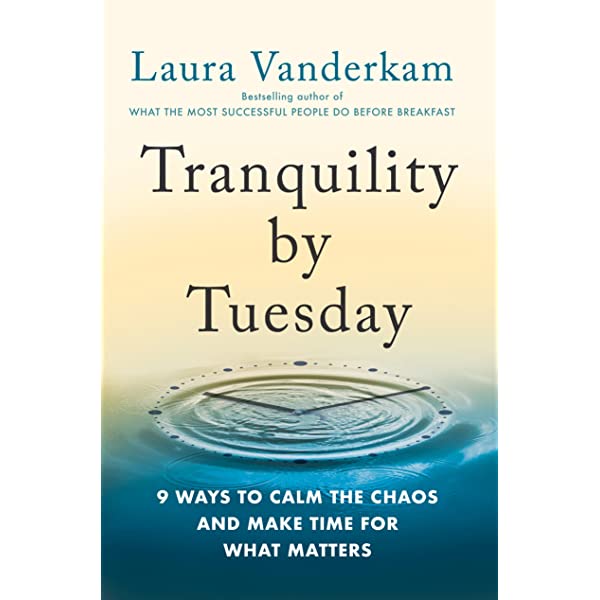In Tranquility by Tuesday: 9 Ways to Calm the Chaos and Make Time for What Matters, Author of What the Most Successful People Do Before Breakfast and 168 Hours: You Have More Time Than You Think, Laura Vanderkam shared nine time management strategies based on a time diary study of over 150 people from the Tranquility by Tuesday Project.
Tranquility is the state of being serene and peaceful, of being free from agitation.
Rule 1: Give Yourself a Bedtime
Going to bed earlier is how grown-ups sleep in.
If you would like to experience the additional energy and optimism that comes from being well rested, choose a time that you would like to go to sleep more nights than not. Then, commit to getting in bed by that time unless you have a compelling reason not to.
- Decide when you plan to wake up most weekdays.
- Decide how much sleep you need.
- Calculate what time you need to be in bed in order to get this amount of sleep.
- Set an alarm for fifteen to thirty minutes before the official bedtime so you can ease into bed.
“The American Time Use Survey, which has thousands of people talk through how they spent the previous 4 a.m. to 4 a.m. day, usually covering all 365 days of the year, found that in 2020, the average person slept 9.01 hours in a twenty-four-hour period (up from 8.84 hours in 2019). In 2019, employed parents with kids under age six averaged 8.32 hours (8.26 for men; 8.39 for women).”
RULE 2: Plan on Fridays
Expectations are infinite. Time is finite. We are always choosing. Choose well.
Days, and likewise years, slip into the past. They do this no matter what you do.
Priority list for the upcoming week:
- Career
- Relationships
- Self
Write this list somewhere you’ll be able to reference, such as in a planner. List a few items—no more than a handful—in each category.
A week is the “unit of repeat” as mathematicians put it, in the pattern of our schedules, at least in any society where you’re likely to be reading this book. A week is long enough to encompass actions beyond immediate crises, but also short enough for you to have a good sense of the landscape, and to be able to commit to times and actions with reasonable certainty.
RULE 3: Move by 3 p.m.
Exercise doesn’t take time, it makes time.
To boost energy, and to make life feel more doable, commit to doing some form of physical activity for at least ten minutes in the first half of every single day. More is better. But ten minutes is a start.
The “move” part of this rule can be any sort of movement. Most people walk, but push-ups, sit-ups, jumping jacks, kettle bell swings, and so forth, are options. Chasing kids around the yard or pushing a stroller counts. Traditional exercise such as running or a fitness class is wonderful if it works.
Regular exercise turns out to be as effective as antidepressants for mild to moderate depression. Exercise works as well as sleeping pills on mild insomnia. One study found that people who walked briskly five times or more over a seven-day period were 60 percent less sensitive to pain than a control group by the end of the week.
RULE 4: Three Times a Week Is a Habit
Things don’t have to happen daily—nor do they have to happen at the same time every day—in order to count in our lives.
Aiming to do something daily—as in seven days a week, or even five—can be challenging. Certain healthy habits, such as moving for ten minutes (see Rule 3) or brushing your teeth, are worth the bother. But for many things, daily isn’t necessary. Things do not have to happen daily, nor do they have to happen at the same time every day, in order to count in our lives.
Rule 5: Create a Back-up Slot
Anyone can make a perfect schedule. Time-management masters make resilient schedules.
- Creating a back-up slot for the things that matter starts with figuring out what matters.
- Get in the habit of leaving regularly scheduled open space in your schedule. That way you have a back-up slot for whatever priority you need to move.
RULE 6: One Big Adventure, One Little Adventure
We don’t ask “where did the time go?” when we remember where the time went.
Each week, aim to plan one larger adventure and one smaller one into your schedule. Doing so can change the entire experience of time, creating memories and an ongoing sense of hope.
- A big adventure means something that requires a few hours—think half a weekend day.
- A little adventure could take just an hour or so, and fit on a lunch break or a weekday evening, as long as it is something out of the ordinary.
Adventure is more a state of mind than an objective standard of measurement.
RULE 7: Take One Night for You
Committing to fun means the fun happens.
Building a career—and raising a family—are meaningful activities, but they require a lot of energy. To do our best, we need time we can count on to recharge, apart from these obligations. We need time to do things we find intrinsically energizing for ourselves, as individuals.
So, each week, take one evening (or an equivalent number of hours) off from family and work responsibilities and do something that makes life feel meaningful and fun.
RULE 8: Batch the Little Things
Tasks expand to fill the available space. When we give them less time, they take less time
Designate a small chunk of time to tackle those things that must be done, but aren’t your top priorities. This could be an afternoon half-hour during the workday, or a bigger blast on Fridays, or a ninety-minute chore, errand, or personal task blitz on one weekend day. When a small task occurs to you or pops up in your inbox, don’t just do it. Put it on the list for your batch processing time, and tackle all of these small tasks then.
RULE 9: Effortful Before Effortless
Leisure time is too precious to be totally leisurely about leisure.
Do just a few minutes of “effortful” fun before checking social media or turning on the TV. You can do this during any long patch of leisure, and during your time confetti too.
Among U.S. social-media users, the average time spent on Facebook is 33 minutes per day, with 31 minutes spent on Twitter, and 29 minutes spent on Instagram. Any suddenly popular new addition (Snapchat, TikTok, Clubhouse . . .) cannibalizes some minutes from existing services but also takes up more time.
As for old-fashioned television, according to the American Time Use Survey, in 2020, the average person with a full-time job still managed to watch 2.24 hours per day as a primary activity. Time is absolutely limited to twenty-four hours per day, and so this effortless leisure tends to crowd out time for more effortful fun such as reading, creative hobbies, or socializing with friends and family—things people claim they’d love to fit into their schedules, if only they could find the time.
All the Best in your quest to get Better. Don’t Settle: Live with Passion.



Comments are closed.